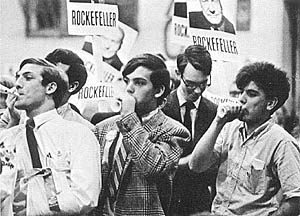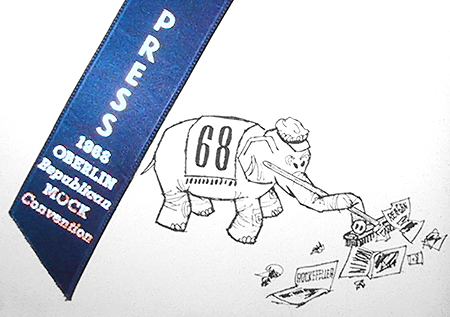Rocky Nominated!
Written Sunday,
May 5, 1968
|
Background: An Oberlin College tradition that many have forgotten is the Mock Convention. For 108 years beginning in 1860, Oberlin students took on the roles of national political leaders of one party or the other, pretending to hold a political convention to select the party's nominee for President. The whole campus got involved.
I was the program director of student radio station WOBC during the last of these big events, the Republican Mock Convention of 1968, seen above. The "convention hall" was Jones Field House. Afterwards, the tradition lapsed, until a scaled-back Democratic Mock Convention in 2004 nominated Howard Dean on the third ballot. Mock conventions became irrelevant because, with the lowering of the voting age to 18, college students gained the right to have a say in the real election. Also, with increasing emphasis on presidential primaries, conventions are no longer the venue where nominees are actually chosen.
Our station not only broadcast the 1968 convention; it also provided the public-address equipment. (See my block diagram below.) Therefore, all but one of our microphones had been taken to the Field House. For the first session on Friday, May 3, my job was to be a disk jockey until the start of our remote broadcast at 7:00 pm. I was the only person back at the radio station, and my only microphone was an old but high-quality condenser mic. It resembled a gray electric toothbrush with a shiny metal disk on the end. The disk was unprotected by any windscreen, and an external power supply kept a voltage on it. I was half afraid that I was going to lean in too close and get electrocuted, but I used the mic to introduce Simon and Garfunkel's "Mrs. Robinson" before switching to the live coverage. Here's what I wrote two days later in a letter to my mother. |
I engineered the Mock Convention radio coverage from 7 to 10:30 pm on Friday [the early shift] and from 9:30 pm to 3 am on Saturday night [the late shift].
I hadn't
planned actually to go out to the Field House where the event was
being held, but I couldn't stay away, so I was there from 10:30 pm to
1:30 am late Friday and from 7 to 9 pm on Saturday, just watching.

Congressman Gerald Ford of Michigan, who will be the permanent chairman of the real Republican convention in Miami, was our permanent chairman on Saturday night. I was there when he gave his speech early in the evening. Ten feet away is about as close as I've ever been to a person of that sort of national prominence.

Our radio coverage of the convention was quite good, and in retrospect the convention wasn't that bad either. They did get bogged down in parliamentary procedure a lot, but the real convention does too. However, I think the mock convention took some shortcuts that the real one never would have taken. For instance, five planks of the platform were adopted as a unit without even being read to the delegates, mainly because it was late Friday night and the delegates were getting tired.
|
Excerpts
from Mark Kurlansky's 2004 book, Up until 1968, the differences between Republicans and Democrats were more a matter of style than ideology. The most popular Republican candidate was New York governor Nelson Rockefeller, a social liberal with notable support among black voters. His only problem with Republicans was the extreme Right, which was bitter in the belief that in 1964 he had failed to help their martyred conservative, Barry Goldwater. But most of the delegates were lined up for Richard Nixon, whom it seemed nobody liked. How had this happened? On March 22 Rockefeller had announced that he was not a candidate. Though it turned out to be an ill-conceived strategy and Rockefeller did get back into the race — he had never really left it — the move left Nixon free to rack up an unbeatable lead in delegates. The Republican Party has never again turned to a politician from its moderate wing for president or vice president. 1968 was the year in which the Republican Party became a far more ideological party — a conservative party in which promising moderates have been marginalized. |

A large number of favorite sons were nominated, and I think about 18 names were placed in nomination. Some I'd never heard of, such as Wally Hickel of Alaska.
With California going for Reagan on the first ballot, Pennsylvania for their governor Schafer, Michigan for Romney, Illinois for Percy, and Ohio for Rhodes, most of the major states were tied up with favorite sons, and not enough votes were free for either of the major candidates (Nixon and Rockefeller) to get a majority on the first ballot. Nixon led, Rockefeller was second, and Reagan was a distant third, with Percy far down in the list.
On the second ballot some of the states abandoned their favorite sons and went for either Nixon or Rockefeller, while Percy slid even further down; however, Nixon was still over a hundred votes short of the 667 needed for nomination.
At this point the chairman of the Illinois delegation, seeing that Percy was not likely to be nominated, made a deal with the chairman of the New York delegation: Illinois would switch its 58 votes to Rockefeller on the third ballot if New York (i.e., Rockefeller) would endorse Percy for Vice-President once Rockefeller was nominated.
When the third ballot was taken, however, the smaller states (including the South) began to go towards Percy. Other states were switching to Rockefeller at the same time, and Nixon was rapidly falling behind.
 Illinois
cast its 58 votes for Rockefeller as planned, but the New York
chairman sensed that Illinois might decide to go back to Percy if
Percy picked up enough support. So he made a second deal with
Pennsylvania, which was still supporting Schafer. If Illinois
did switch back to Percy, Pennsylvania would give its 64 votes to
Rockefeller in return for a vice-presidential nomination for Schafer.
Illinois
cast its 58 votes for Rockefeller as planned, but the New York
chairman sensed that Illinois might decide to go back to Percy if
Percy picked up enough support. So he made a second deal with
Pennsylvania, which was still supporting Schafer. If Illinois
did switch back to Percy, Pennsylvania would give its 64 votes to
Rockefeller in return for a vice-presidential nomination for Schafer.
At the end of the third ballot but before the results were officially tallied, Rockefeller had just enough votes for nomination. Illinois then announced it was changing its vote to Percy, which would have taken enough votes away from Rockefeller to deny him the nomination and send the convention on to a fourth ballot; but Pennsylvania immediately switched its vote from Schafer to Rockefeller, thus giving him the nomination.
For vice-president, New York was true to its word and supported Schafer, but he had little other support. After one ballot the votes were badly split among a dozen vice-presidential candidates. But vote-changing went on for half an hour before the results were tallied; eventually Reagan got a majority on the unofficial count, so the vote-changing was stopped and the votes counted.
The ticket: Rockefeller and Reagan.


 My
description below of maneuvers and multiple ballots seems to be from
another era entirely. The photos are from the Oberlin Alumni
Magazine of June 1968 and Summer 2004, and from the 1968 college
yearbook, the Hi-O-Hi. The elephant cartoons are from
the Mock Convention Magazine. As to why the delegates
voted as they did, the reports in those publications differ slightly
from my information, which came from listening to WOBC.
My
description below of maneuvers and multiple ballots seems to be from
another era entirely. The photos are from the Oberlin Alumni
Magazine of June 1968 and Summer 2004, and from the 1968 college
yearbook, the Hi-O-Hi. The elephant cartoons are from
the Mock Convention Magazine. As to why the delegates
voted as they did, the reports in those publications differ slightly
from my information, which came from listening to WOBC.